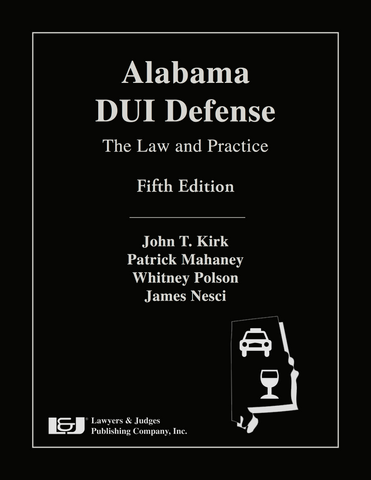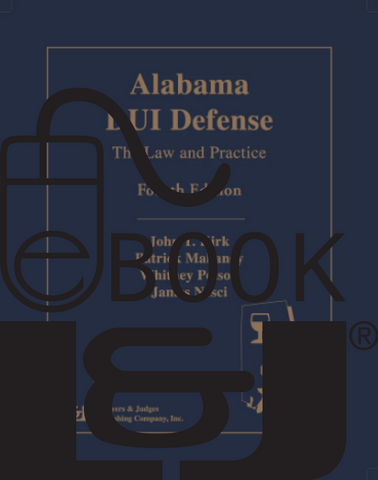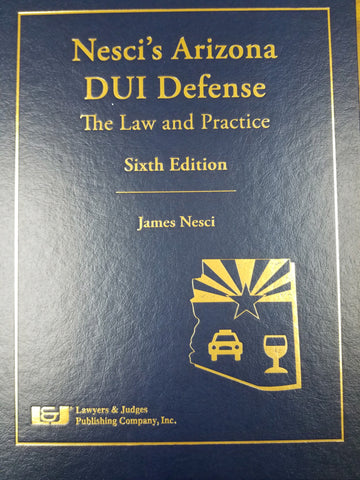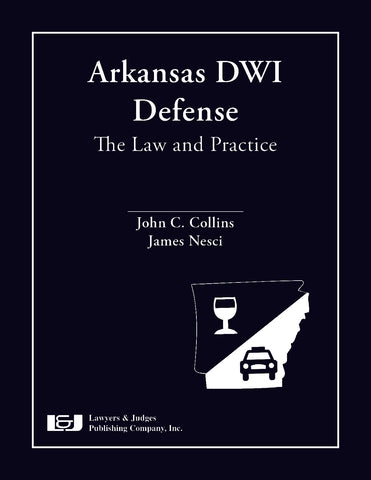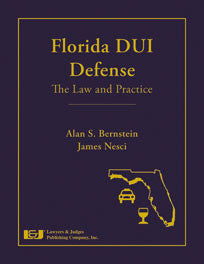
Florida DUI Defense: The Law & Practice with DVD
- Author: Alan S. Bernstein, James Nesci
- ISBN-10: 1-933264-89-6
- ISBN-13: 978-1-933264-89-9
- Copyright Date Ed: September 1, 2012
- Pages: 384
- Binding Information: Casebound with DVD
- Size: 8.5 ✕ 11 Inches (US)
For even the most seasoned attorney admitted to practice in the State of Florida, defending DUI cases has always presented special challenges. Today mounting a successful defense is more difficult than ever. Now you have the advantage with Florida DUI Defense: The Law and Practice. This text and supplementary DVD contains the most important information to help you attain a successful verdict.
Written by Alan S. Bernstein and James Nesci, both members of the National College for DUI Defense,Florida DUI Defense: The Law and Practice ensures that you understand the chemical, biological and technological concepts and issues underlying DUI prosecution and defense in the State of Florida. The authors provide the most up-to-date information available on key areas of DUI law in Florida including: DUI Investigations, Driving and Field Sobriety Testing, Drug Recognition, Evaluation and Chemical Testing, Blood Alcohol Calculations, Pre-trial Investigations and Motions, Practice, Plea Offers and Agreements, DUI Trial Procedures, and more.
Many practical tools and applications designed to streamline and simplify the complex DUI defense process have been developed along with this book. They are all included on a bonus DVD--so you can locate, review and print them out in a matter of seconds. The companion DVD contains NHTSA studies, articles and visual detection videos.
Lawyers & Judges has published twenty state-specific DUI defense reference books. A practitioner in Colorado raved in the Colorado Lawyer that Colorado DUI Defense: The Law and Practice is “a must-have resource” and would make “a nice gift for the lawyers in your life who practice DUI defense.” The Wisconsin Lawyer reviewer gave Wisconsin OWI Defense: The Law and Practice a touchdown review, calling the book “the best book I have read pertaining to Wisconsin operating-while-intoxicated (OWI) law, and one of the best in dealing with the substance of OWI law.”
Book Topics Include:
- Types of DUI
- Role of the Motor Vehicle Division
- Pre-trial investigation
- DWI investigations
- Driving behavior
- Field sobriety testing
- Drug recognition
- Chemical testing for alcohol and drugs
- Blood alcohol calculations
- Use of expert witnesses
- Pre-trial motions
- Plea offers
- Revised sentencing charts
- DUI jury trial information
- Client relations
- Ethics and advertising
DVD topics include:
- USDOT "Drugs That Impair Driving" student manual and teacher manual
- USDOT "DWI Detection and Standardized Field Sobriety Testing" student manual and teacher manual
- SFST validation studies
- USDOT "SFST Refresher Training Course" student manual and teacher manual
- MVD court abstracts
- NHTSA "The Detection of DWI Motorcyclists" brochure
- NHTSA "Use of Sobriety Checkpoints for DUI" article
- NHTSA driving and blood alcohol concentration studies
- NHTSA visual detection videos
- And more!
Table of Contents
Chapter 1: Lawyer Advertising
1.1 Ethical Issues
1.2 Advertising Resources
A. Phone Book Advertising
B. Internet Advertising
Chapter 2: Client Relations
2.1 Meeting the Prospective Client
2.2 Client Intake Questions
2.3 Client Intake Interview
2.4 Retainer Agreements
2.5 Fees
2.6 IOTA
2.7 Communication
2.8 Client File Retention
Chapter 3: Driving Under the Influence
3.1 Types of DUI: Florida Statute § 316.193
3.2 DUI and Persons Under the Age of 21
3.3 Operating Commercial Motor Vehicles
Chapter 4: Department of Highway Safety and Motor Vehicles (DHSMV)
4.1 Overview
4.2 The Implied Consent Form
4.3 Notice of Suspension
4.4 Administrative Suspension Under Ch. 322.2615
4.5 Informal Review
4.6 Formal Review Hearing
4.7 Witness Subpoenas
4.8 Time Computations
4.9 Financial Responsibility
4.10 Ignition Interlock Requirement for Reinstatement
4.11 Ignition Interlock Devices
4.12 Suspension of License for Persons Under 21 Years of Age
4.13 Legal Grounds to Challenge the Suspension (Defenses to Suspension)
A. Recantation of Refusal
B. Right to an Attorney Prior to Taking Chemical Test and Confusion Doctrine
C. Stop Issues
D. Seizure Issues
E. Safe Harbor Doctrine
F. Vehicle Inoperable
G. Probable Cause to Arrest
4.14 Request for Rehearing Under Chapter 322.2615
4.15 Administrative Suspension for Florida Licensees Incurring Out-of-State Violations
4.16 Validity of Out-of-State Licenses in Florida
4.17 Appeals From DHSMV Administrative Final Order
4.18 DHSMV Driver Points System
4.19 Commercial Driver’s Licenses
4.20 Administrative Suspensions for Commercial Driver Licensees
4.21 Expungement of Driver License (DL) Record
4.22 Mandatory Revocation of Driver’s Licenses
Endnotes
Chapter 5: Pre-Trial Investigations
5.1 Overview
5.2 Proper Filing Techniques
5.3 Visiting the Scene
5.4 Photography and Videos
5.5 Diagrams and Aerial Photography
5.6 Accident Reconstruction
5.7 Event Data Recorders (Black Boxes)
5.8 Roadblock (a.k.a. “DUI Checkpoint”) Investigations
5.9 Pre-Trial Depositions, Emergency Personnel
5.10 Pre-Trial Depositions, Civilians
Chapter 6: Pre-Trial Motions Practice
6.1 Overview
6.2 Procedural Motions
6.3 Substantive Motions
6.4 Motions in Limine
6.5 Evidentiary Hearings
Chapter 7: Plea Offers
7.1 Types of Pleas
7.2 Responsibilities of Counsel and Trial Judge
7.3 Standing Mute or Pleading Evasively
7.4 Failure of Corporation to Appear
7.5 Plea of Guilty; Operation in Denial
7.6 Withdrawal of Plea of Guilty or No Contest
7.7 Vacation of Plea and Sentence Due to Defendant’s Noncompliance
7.8 Plea of Guilty to Lesser Included Offense or Lesser Degree
7.9 Plea of Guilty to an Offense Divided into Degrees; Determination of the Degree
7.10 Pleading to Other Charges
7.11 Guilty or Nolo Contendere Plea
7.12 Immigration Consequences
Chapter 8: Trial
8.1 Overview
8.2 Voir Dire and Jury Selection
8.3 Jury Instructions
8.4 Opening Statements
8.5 Cross-Examination
8.6 Direct Examination
8.7 Closing Argument
Chapter 9: DUI Investigations:Driving and Field Sobriety Testing
9.1 Overview: National Highway Traffic Safety Administration (NHTSA)
9.2 Driving Behavior
9.3 Standardized Field Sobriety Testing (SFST) Validation Studies
9.4 Legal Analysis and Summary of the SFST Validation Studies
9.5 Standardized Field Sobriety Test Battery
9.6 Horizontal Gaze Nystagmus (HGN)
9.7 Refusal of SFSTs and General Admissibility
9.8 Commonly Used Non-Standardized/Non-Validated Field Sobriety Tests
9.9 Videotaping the Driving and Investigation
Chapter 10: Drug Recognition Evaluation
10.1 Overview
10.2 DRE Statutory Law
10.3 Per Se Statutes Comparison
10.4 Impairment Statutes Comparison
10.5 Defenses
10.6 Implied Consent Laws Comparison
10.7 DRE Case Law
10.8 The 12-Step DRE Protocol
10.9 Deconstruction and Analysis of the 12-Step DRE Protocol
10.10 Effects of Various Drugs
10.11 Drug Evaluation Classification Protocol (DECP)
10.12 Drug Evaluation Classification Training Program
Chapter 11: Chemical Testing
11.1 Preliminary Breath Testing
11.2 Law
11.3 Safeguards
11.4 Commonly Used PBT Devices
11.5 Understanding Henry’s Law and the Blood to Breath Ratio
11.6 Evidential Breath Testing
11.7 Infrared Light Absorption
11.8 Basic Operation
11.9 Intoxilyzer® Printouts
11.10 Breath Testing: Methods of Attack
11.11 Calibration
11.12 Florida Administrative Code Chapter 11D-8
11.13 Statutory Requirements for Admissibility of Breath Test Results
11.14 Blood Testing: From the Vein to the Lab
11.15 Headspace Gas Chromatography
11.16 Blood Draws: Statutory Admissibility, Sample Preservation and Independent Testing (See §316.1932 Florida Statutes)
11.17 Secondary Blood Testing
11.18 Possible Errors in Blood Testing
References
Chapter 12: Blood Alcohol Calculations for Attorneys
12.1 Blood Alcohol Calculations for Attorneys
12.2 Determining the One-Drink Potential
12.3 Elimination and Retrograde Extrapolation
12.4 White’s Retrograde Extrapolation
12.5 Partition Ratio Conversions
12.6 Unit Conversions
Chapter 13: Expert Witnesses
13.1 Overview
13.2 Pre-Trial Preparation
13.3 Direct Examination of the Defense Expert Witness
13.4 Cross of the State’s Expert Witness
13.5 Direct Examination of the State’s Expert as a
Defense Witness
Chapter 14: DUI Jury Trial Warpack
14.1 Actual Physical Control (APC)
14.2 Aggravation
14.3 Appellate Standard of Review
14.4 Arrest
14.5 Blood Draws
14.6 Breath Testing
14.7 Burden of Proof
14.8 Chain of Custody
14.9 Circumstantial Evidence
14.10 Closing Arguments—Ethical Considerations
14.11 Comment on Defendant’s Silence
14.12 Confrontation
14.13 Corpus
14.14 Court Rules
14.15 Credibility of Witnesses
14.16 Destruction of Evidence
14.17 Discovery
14.18 Judgment of Acquittal
14.19 Double Jeopardy
14.20 DRE: Drug Recognition Evaluation Admissibility
14.21 Due Process
14.22 Evidence
14.23 Expert Witnesses
14.24 Field Sobriety Test Admissibility
14.25 Foundation
14.26 HGN
14.27 Impeachment
14.28 Independent Test
14.29 Jurors and Jury Selection
14.30 Jury Deliberations
14.31 Jury Instructions
14.32 Jury
14.33 Motions
14.34 Miranda
14.35 DHSMV
14.36 Opinion Testimony
14.37 Plea Agreements
14.38 Probable Cause
14.39 Reasonable Suspicion
14.40 Refusal to Submit to Chemical Testing
14.41 Relation Back
14.42 Replicate Testing
14.43 Restitution
14.44 Roadblocks (a.k.a. “DUI Checkpoints”)
14.45 Speedy Trial
14.46 Searches
14.47 Sentencing
14.48 Suppression Hearings: Fellow Officer Rule
14.49 Voir Dire
14.50 Voluntariness of Statements
References
Appendix A: DWI—Modern Day Salem Witch Hunts
Appendix B: The Aging Process and Field Sobriety Tests
Appendix C: Chapter 11D-8, Implied Consent Program
Appendix D: Florida Evidence Code
Appendix E: DUI Penalties

